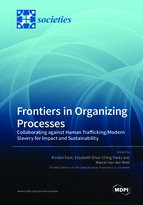Understanding and Pursuing Labor Trafficking Cases Collaboratively
Round 1
Reviewer 1 Report
I appreciated the opportunity to read your paper and have provided some comments. I intend them to be constructive and hope they are helpful.
As my comments on your draft hopefully reflect, I think that your central claim (that collaborative task forces can advance law enforcement efforts to address labor trafficking) is an interesting one and, as far as I know, has not been written about in the US context. I would focus more on your claim and remove or streamline much of the general background about labor trafficking, trauma, and other topics that others have written about in more depth elsewhere.
I also think that the paper needs many more cites to existing research and academic papers on the subjects you cover as well as support for some of the claims you make. Others have written on much of what you cover regarding labor trafficking and law enforcement failures (though, as far as I know, not on task forces) and referencing and building on their work (to the extent you agree) will strengthen the paper, I think.
In terms of large scale organization, I think that it could be revised to focus on your central claim. My initial instinct is that the organization of your paper could be something like: (1) brief background (labor trafficking, failure to prosecute it); (2) what are task forces; (3) how could they be helpful in the labor trafficking context; (4) how can they be established (you have a section on identifying participants using the barrier method and I thought that was the strongest section and that would belong in this section); (5) what are potential challenges and shortcomings.
As you will see in my comments, I encourage you to discuss both foreign national and US-born labor trafficking victims. The current exclusion of US-born victims gives the impression that all victims are foreign nationals and also limits your discussion of the utility of task forces (and limitations of law enforcement).
Comments for author File: ![]() Comments.pdf
Comments.pdf
Author Response
Please see the Word document attached for a review of how I addressed the reviewers 86 comments.
Author Response File: ![]() Author Response.docx
Author Response.docx
Reviewer 2 Report
- The article is clear on what the authors want to communicate and the direction of the manuscript. The authors did a great job breaking down the sectors in which labor trafficking manifests; furthermore, the article provides an example under each sector. The article will be a great contribution to the literature. However, the article is lacking current peer-reviewed citations. The majority of the article's citations are from governmental reports. The few peer-reviewed journal articles cited are dated. This article would be strengthened by providing citations and/or empirical research from the past five years.
- The underlining of key business sectors is helpful to the reader. Point 4. Agriculture needs to be underlined.
Author Response
Please read my response in the Word document, which is attached. Again, my thanks to Reviewer 2 for their time and suggestions.
Author Response File: ![]() Author Response.docx
Author Response.docx





